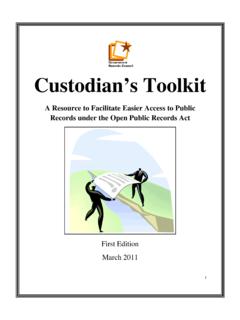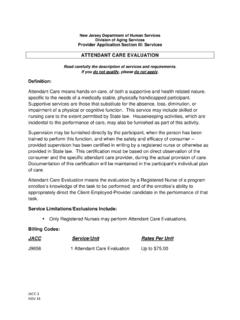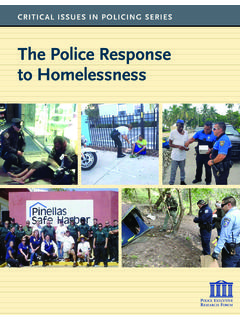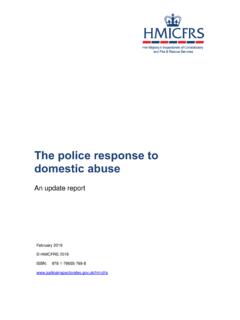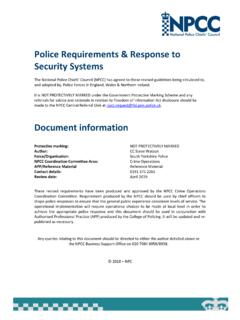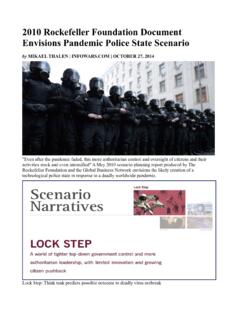Transcription of Attorney General s Bias Incident Investigation Standards
1 Page 1 of 16 Attorney General s bias Incident Investigation Standards TO: All Law Enforcement Chief Executives FROM: Gurbir S. Grewal, Attorney General of New Jersey DATE: April 5, 2019 SUBJECT: Revised bias Incident Investigation Standards Attorney General s Law Enforcement Guideline Pursuant to the Criminal Justice Act of 1970, 52:17B-97, et seq., all prior versions and amendments of the Attorney General s bias Incident Investigation Standards are hereby rescinded and replaced by this new, revised version. 1. POLICY STATEMENT FROM THE Attorney General TO NEW JERSEY LAW ENFORCEMENT bias incidents are increasing throughout the State and the nation. As a result, communities have been gripped by uncertainty, tension, and conflict. The promulgation of the Attorney General s bias Incident Investigation Standards ( Standards ) serves as recognition that the unique nature of suspected or confirmed bias incidents requires special handling by the New Jersey law enforcement community.
2 Crimes with a component of intimidation based on race, color, religion, gender, disability, sexual orientation, gender identity or expression, national origin, or ethnicity manifest themselves in a wide spectrum of anti-social activities. These bias incidents jeopardize the active and open pursuit of freedom and opportunity. They erode, undermine, and attack the identity and heritage of our citizens. They also dehumanize people based solely on group affiliation and shake the very foundations of our cultural and religious institutions, as well as our longstanding pursuit of tolerance and acceptance. Therefore, it shall be the policy of New Jersey law enforcement to bring the investigative and enforcement elements of the law enforcement community into quick action following any and all suspected or confirmed bias incidents.
3 There shall also be special emphasis placed on victim assistance and community relations in order to reduce victim trauma and community tension or fear. All suspected or confirmed bias incidents are serious and should be treated as such. bias Incident investigations shall be conducted in a timely fashion using all appropriate resources to rapidly determine the facts and circumstances surrounding each Incident . Careful attention should be given to identifying the motive and cause of the bias Page 2 of 16 Incident and to identifying suspects. Referrals to the County Prosecutors Offices of Victim-Witness Advocacy or to the Division on Civil Rights shall be made as appropriate. The proper Investigation of a suspected or confirmed bias Incident is the responsibility of each New Jersey law enforcement agency confronted with this problem.
4 Each law enforcement officer must be sensitive to the feelings, needs, and fears that may be present in the victims, and the community at large, as a result of a suspected or confirmed bias Incident . Law enforcement agencies handling bias incidents shall: Approach victims in a sensitive and supportive manner. Reassure victims that appropriate investigative and enforcement methods will be used by the law enforcement agency to properly address the bias Incident . Ensure that a thorough and complete initial response and follow-up Investigation are conducted as required by the facts and circumstances surrounding the suspected or confirmed bias Incident , which includes providing for appropriate community relations activities and crime prevention programs.
5 Refer the victims/witnesses to the appropriate Office of Victim-Witness Advocacy or the Division on Civil Rights, where appropriate. Interact with concerned community service organizations, civic groups, and religious institutions regarding the suspected or confirmed bias Incident . Effectively calm victims and reduce their fear and alienation through direct, ongoing official communication regarding the bias Incident . Notify the Division of Criminal Justice (DCJ), the Division of State police (NJSP), and the appropriate County Prosecutor s Office of all bias incidents as detailed herein. Ensure that victims and other concerned parties are afforded all the rights and protections provided under the New Jersey Constitutional Amendment for Victim s Rights ( Const.)
6 Art. I, para. 22) and the Crime Victim s Bill of Rights ( 52:4B-34, et seq.) It must be remembered that the actions taken by New Jersey law enforcement in responding to suspected or confirmed bias incidents are visible signs of concern and commitment to the citizens of the communities we serve. 2. PURPOSE OF THE bias Incident Investigation Standards The purpose of these Standards is to establish uniform law enforcement procedures for the response to, and Investigation of, bias incidents. Page 3 of 16 New Jersey law enforcement shall take an active role in promoting peace and harmony among the diverse groups living and working within the State and protect all citizens from bias incidents. New Jersey law enforcement agencies shall conduct a thorough and complete Investigation of all suspected or confirmed bias incidents and shall cooperate with prosecutors in the prompt and appropriate prosecution of these matters.
7 To accomplish these purposes, the chief executives of all law enforcement agencies shall apply the elements of these Standards to their individual agencies through a formal written order or directive which reflects the individual needs of each New Jersey law enforcement agency and the community it serves. 3. DEFINITION OF bias Incident AND RELATED CRIMINAL VIOLATIONS For New Jersey law enforcement purposes, a bias Incident is defined as any suspected or confirmed violation of 2C:16-1(a)(1) or (2).1 Some suspected bias incidents may not clearly fit the described definition. In those cases, a common sense approach to the Incident must be used. If an Incident appears to be bias -based, it should be investigated and reported as such. Verification of motive and intent can be made during the ensuing Investigation .
8 Law enforcement officers must recognize that a single bias Incident may initially appear as less serious when viewed in the larger context of all crime. Nonetheless, any suspected or confirmed bias Incident is serious by its very nature. What may appear to be a minor Incident can easily escalate into a larger problem or public safety concern. 4. REQUIREMENT TO REPORT ALL bias INCIDENTS It is the duty of all law enforcement agencies in the State to report bias incidents to the New Jersey Attorney General s designees. DCJ and NJSP have designated an electronic reporting system for this purpose -- the Electronic Uniform Crime Reporting (eUCR) portal. When a bias Incident report is submitted through the eUCR portal, the information is automatically forwarded to the bias Crimes Unit at DCJ, the NJSP, the New Jersey Office of Homeland Security and Preparedness, and the appropriate County Prosecutor.
9 Local law enforcement agencies shall report all confirmed or suspected bias incidents through the eUCR system as soon as is practicable, but not more than 24 hours from the initial law enforcement response . Under current eUCR procedures, each law enforcement agency in New Jersey receives a single log-in for the eUCR system. Chief 1 Subsection (3) was ruled unconstitutional in State v. Pomianek, 221 66, 91 (2015). Page 4 of 16 law enforcement executives must plan accordingly to ensure their agencies meet the reporting requirements of this In cases of suspected or confirmed bias incidents involving: (1) homicide, aggravated sexual assault, sexual assault, aggravated assault, or arson; (2) a law enforcement officer as the alleged perpetrator; (3) an organized hate group as the perpetrator; or (4) a potential to generate large-scale public unrest, the local law enforcement agency shall also immediately notify the bias Crimes Unit at DCJ.
10 Such immediate notification is to be made by calling the bias Crimes Unit duty phone, the number of which is available on DCJ s website at The local law enforcement agency also must immediately notify the appropriate County Prosecutor of such an Incident . Each County Prosecutor retains the discretion to establish procedures for such notification. In bias incidents where there is a nexus to terrorism, such as when an organized hate group is involved, the Attorney General s SAR Reporting Directive, No. 2016-7, requires additional notifications. Suspicious activity with a nexus to terrorism must be reported immediately, per existing county protocols. Activity also can be reported 24/7 to NJOHSP s CTWatch at 866-4 SAFENJ (866-472-3365) or It is the responsibility of the chief executive of each local law enforcement agency to institute policies and procedures to ensure compliance with this reporting requirement.
